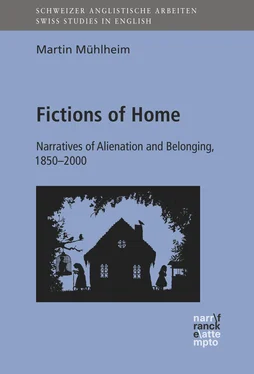Just as the bodybody is a home in which we can never feel fully at home, so do both the world and the selfself necessarily retain an unhomelyunhomely (or uncannyuncanny) core.61
However, while all humans share this precondition for alienationalienation, circumstances will shape the way in which they will have to confront it. Accordingly, SchmittSchmitt, Richard rightly insists that “the struggle against the precondition of alienationalienation is much more difficult for some people than for others” – not least because some lives “are too burdened by external conditions” (51). Some people, that is to say, lack the material or mental resourcesresources to deal adequately with the fundamental ambivalenceambivalence of the human condition, either because of individual experiences (e.g. a traumatic childhoodchildhood), or because they live in societies that “systematically starve their members of the opportunities to learn how to live” (SchmittSchmitt, Richard 76).62 In other words, while it is impossible to remedy the precondition of alienationalienation – or what Dominick LaCapraLaCapra, Dominick has called “structural or existentialexistential & existential angst/trauma traumatrauma and shell shock” ( History and Memorymemory after Auschwitz 47) – we may distinguish between those societies that enable their members to cope with the Geworfenheitthrownness or Geworfenheit of human existence, and those societies that withhold the necessary resources or even exacerbate alienationalienation. Applying SchmittSchmitt, Richard’s distinction to Moby-Dick , we can thus say that Ishmael subtly shifts from a more specific sense of alienationalienation as the result of particular circumstances to the precondition for alienationalienation (i.e. the idea that human selfhoodselfhood itself makes alienationalienation possible), thereby obscuring the biographical and social roots of his own condition.
And indeed, once we begin to view Ishmael’s rhetoric more skeptically, we find that some of his other explanations, too, fail to solve the problems he pretends to address. For instance, after having – ostensibly – answered the question why he decided to go to sea, Ishmael tries to explain why he chose to do so as a common sailor rather than as a passenger. The first reason he offers is, once again, pecuniary: “For to go as a passenger you must needs have a purse, and a purse is but a rag unless you have something in it” (20; ch. 1). Ishmael’s decision is thus due primarily to his want of financial resourcesresources. However, he immediately adds that he would rather be a sailor than a passenger anyway because passengers generally “do not enjoy themselves much” (20; ch. 1). Moreover, Ishmael claims that he prefers being a “simple sailor” to being “a Commodore, or a Captain, or a Cook” because he strongly dislikes “all honorable and respectablerespectability toils” (20; ch. 1). Not only is this assertion at odds with his later arguments for the dignity of whaling (e.g. ch. 82, “The Honor and Glory of Whaling”); it is also difficult to reconcile Ishmael’s first two explanations – lack of money, and a preference for lowly work – with the third reason he gives for deciding to become a sailor: “It is quite as much as I can do to take care of myself, without taking care of ships, barques, brigs, schooners, and what not” (20; ch. 1). In yet another rhetorical shift, Ishmael now claims that his becoming a sailor rather than a commander was not truly an act of choice, but instead derives from his awareness that he is barely able to take care of himself and therefore quite simply unable to assume any responsibilityresponsibility for others. There is thus, once again, a move from an apparently contingentcontingent cause – Ishmael’s lack of money, combined with a proud disdain for the easy life of the passenger – to an underlying, more general problem in his life.
Furthermore, not content with this shift from free choice to inability, Ishmael then tries to remold his argument into a general philosophyphilosophy of life. In order to explain why he is perfectly content to bear the indignities associated with the life of a common sailor, Ishmael resorts to a lofty notion of metaphysicalmetaphysical justice:
What of it, if some old hunks of a sea-captain orders me to get a broom and sweep down the decks? What does that indignity amount to, weighed, I mean, in the scales of the New Testament? […] Who aint [sic] a slave? Tell me that. Well, then, however the old sea-captains may order me about – however they may thump and punch me about, I have the satisfaction of knowing that it is all right; that everybody else is one way or other served in much the same way – either in a physical or metaphysicalmetaphysical point of view, that is; and so the universaluniversal thump is passed round, and all hands should rub each other’s shoulder-blades, and be content. (21; ch. 1)
Ishmael here transforms what could be a cause for discontent – i.e. the fact that his decision to go to sea was dictated by povertypoverty – into a philosophyphilosophy of political quietism: one should simply be content with whatever life happens to offer because everybody is a slave in one way or another. Friedrich NietzscheNietzsche, Friedrich would, arguably, deride Ishmael’s humility as one variant of what NietzscheNietzsche, Friedrich called “slave moralitymorality”: a morality of the oppressed that values “the kind, helping hand,” and that regards power as inherently evilevil ( Beyond Good and Evil 203; § 260).63 At any rate, even if we are less polemically inclined than NietzscheNietzsche, Friedrich, Ishmael’s claim that he prefers working as a common sailor to being a commander “because of the wholesome exercise and pure air of the forecastle deck,” as well as his suggestion that it is often “the commonality [who] lead their leaders,” look suspiciously like wishful thinking (21; ch. 1). What Ishmael wants us to believe, in effect, is that he dislikes both the “honorable toils” of a commander (which he is unable to perform) and the comfort of the passenger (which he cannot afford), preferring instead a life of indignities because such indignities are, ultimately, shared equally by all – at least from a metaphysicalmetaphysical point of view. In short, Ishmael prefers to do what he cannot help doing because it is morally correct anyway (“I have the satisfaction of knowing that it is all right”). This may be a comforting philosophy for our narrator (as well as for others who find themselves in dire straits), but it is hardly a convincing analysis of the situation. And indeed, even Ishmael himself admits that he is at a lossloss to explain why he decided to enlist on a “whaling voyage” rather than to join a merchant ship, as he had done on previous occasions. He concludes that this mystery must form “part of the grand program of Providence” (21–22; ch. 1). What began as a simple question of money – or, to be precise, the lack of it – has thus miraculously metamorphosed into the providential shape of a transcendental necessity.
The key point of the discussion so far is that Ishmael does everything in his rhetorical power to mitigate a fundamental sense of unbelonging. His humorous tone, for instance, constitutes an attempt to downplay the seriousness of the condition he describes. In addition, he goes out of his way to find other stories that are similar to his: the biblical Ishmael’s, Perth’s, and even the mythmyth of Narcissus. However, Ishmael succumbs to the temptation to use these stories – particularly the myth of Narcissus – to diffuse the historical particularity of his situation; he no longer appears as an alienated outsider, but as someone who shares in a universaluniversal human condition. This strategy provides Ishmael with symbolicalsymbolical comfort, but it also comes at a political cost, as it leads him to embrace a quietist worldview in which resistanceresistance to injusticeinjustice finds little conceptual space. We discover, in short, that there is sometimes a very thin line between, on the one hand, the desiredesire to belong, and, on the other, a problematic kind of moral conformism that impairs one’s ability to question the status quostatus quo.
Читать дальше












